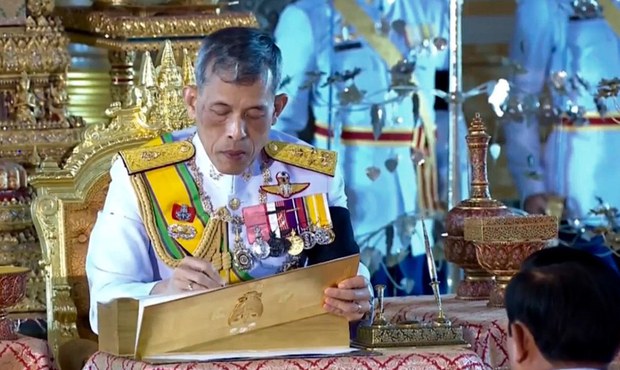Thailand Has a New Constitution
2017.04.06
Bangkok
 King Maha Vajiralongkorn signs Thailand’s 20th constitution during a ceremony at Ananta Samakom Throne Hall in Bangkok, April 6, 2017.
King Maha Vajiralongkorn signs Thailand’s 20th constitution during a ceremony at Ananta Samakom Throne Hall in Bangkok, April 6, 2017.
Thailand’s king Thursday endorsed a junta-backed constitution that frames a timetable for elections potentially as late as November 2018 and allows the military, critics say, to influence the process and keep a grip on government.
Hours after King Maha Vajiralongkorn signed the 20th constitution since 1932 during a pomp-filled ceremony in Bangkok, Prime Minister Prayuth Chan-o-cha announced that the new charter was law but it could take up to 19 months before Thailand held its first elections since the military seized power in May 2014.
“The government cannot tell when the elections will be …,” Prayuth, the junta chief, said Thursday night on national television as he listed legal steps needed for elections to become a reality.
“But we know today is the beginning of the announcement of the constitution and it will be followed by the other events.”
Since toppling Prime Minister Yingluck Shinawatra’s government nearly three years ago amid political turmoil and chaotic street demonstrations, the National Council for Peace and Order (NCPO), as the junta is formally known, has kept promising elections as part of its roadmap to putting Thailand back on a path to democracy.
On at least four occasions, NCPO officials have pushed back dates for prospective elections, while the junta has arrested pro-democracy activists and critics as well as banned large political gatherings and demonstrations.
The royal endorsement of the constitution, a key step in its enactment, was delayed three months because the king requested that parts pertaining to his rule be amended, including allowing him to govern the country from abroad.
The televised ceremony at the Ananta Samakom Throne Hall, during which the king signed the charter in the presence of Prayuth, leaders of the legislative and judicial branches of government, took place on the 235th anniversary of the beginning of the Chakri Dynasty. Afterward, the constitution was published in the Royal Gazette.
When he appeared before the cameras in the evening, the prime minister said it could take between 13 and 14 months for the legislature to pass a set of 10 so-called organic laws required for setting up elections. Then, as stipulated in the new charter, the country’s Election Commission would have up to five months to organize and stage elections, Prayuth said.
“From today on, there will be … these events: the drafting of the organic laws, within eight months, and reviewing of organic laws by the National Legislative Assembly, within two months. It will need an additional one month, if changes are required. Then the laws need royal approval within 90 days,” Prayuth said.
Meanwhile, Meechai Ruchupan, chairman of the Constitution Drafting Committee that wrote the charter, said the timetable for elections rested on several factors and it was not possible to predict exactly when polls would take place.
“It depends on whether or not the drafting of organic laws faces trouble. No one can predict possible problems,” he told reporters at parliament, referring to the possibility that political parties might disagree on some of these organic laws, according to local media.
‘Isn’t it time for elections now?’
Abhisit Vejjajiva, the leader of the pro-royalist Democrat Party and a former prime minister, said Thursday it was ready to organize itself for elections and start campaigning.
“It is up to the NCPO to lift the political activity ban. It is possible that it will ease the ban. We have put a priority on recruiting new members and preparing key platforms,” he said on TNN television.
Anutin Charnvirakul, leader of the Bhumjaithai Party, called for parties to unite over the passage of the organic laws.
“We saw the intention of the government to return to democracy and think it will not delay the process, so all parties should cooperate in the process,” he said.
Somkid Cheukong, an MP with the opposition Pheu Thai Party whose government was toppled in the May 2014 coup, said elections could no longer wait.
“Isn’t it time for elections now? Or will we walk without a goal? I think the nation should walk forward and should have political parties that come from elections,” Somkid told BenarNews.
The charter, approved by a 61 percent majority in a referendum in August 2016, is controversial because it contains provisions that allow the military to add 100 seats to the Senate and appoint all its members. Six of those seats will be reserved for chiefs of the armed forces. All 250 senators also have the power to help members of the 500-seat National Legislative Assembly appoint a new prime minister.
Before the king put his signature on the constitution, global rights watchdog Amnesty International called on Thailand to end human rights abuses under the junta.
“While Thailand’s new constitution sets the stage for general elections and lays out a wide range of rights and liberties, it does little to correct the dire human rights situation in the country,” Champa Patel, Amnesty’s Southeast Asia director, said Thursday in a statement.
“Thailand’s military government retains its carte blanche authority to rule by diktat until elections are held, and future governments will have free rein to restrict human rights on various vaguely-defined grounds.”







